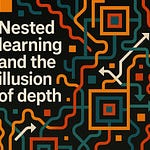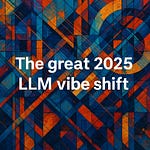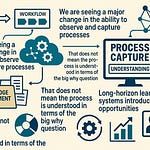Thank you for tuning in to this audio only podcast presentation. This is week 194 of the Lindahl Letter publication. A new edition arrives every Friday. This week the topic under consideration for the Lindahl Letter is, “The top 10 quantum computer leaderboard.”
…and we are back writing extra fresh weekly research notes for your inbox. My current writing process involves working during some weekend morning writing sessions to produce a one week forward product. At some point, it is entirely possible that we will get back to the 5 week production process that I used for the last few years, but that is not on the current production roadmap for the foreseeable future. You can think of this like a weekly research sprint with a solid weekly written narrative based retrospective. We are going to stay timely, focused, and consistent in terms of delivery and quality.
During this fine Saturday morning with some absolutely beautiful weather in Denver, Colorado, I’m working to pull together a list of the biggest verifiable quantum computers based on the qubit count and their country of origin. A lot of different ways exist to assemble this potential list. The list is going to effectively be a top 10 leaderboard snapshot that I check in on a quarterly basis or when a new major announcement happens to just figure out how much change is happening in the space. I think a separate research question exists related to some of the investment returns people have seen in the quantum computing space. Spoiler alert: some of the returns have been huge like IonQ, D-Wave Quantum, and Rigetti Computing, but that is a topic I’ll dig into during another research note. This topic has been added to the brand new research topic backlog for future consideration.
This particular research note is focused on cataloging the best quantum computing systems so we can compare them to what is going to be released going forward to better understand the rate of change. My thesis here is that the rate of change in terms of qubits is about to radically increase. We are going to see the number of qubits increase, unlocking some use cases that were not practical before the increase. Players like Amazon are getting into the quantum computing space with products like the Ocelot chip [1]. A lot of roadmaps like the one from IBM currently exist with new builds of major flagship quantum computers that incorporate error-correction [2]. Keep in mind that right now both IBM and AWS will sell you quantum computing time [3][4]. I made another backlog reminder to run some quantum code on both of those services to see the services in action and provide feedback.
Top 10 quantum computers by universal gate-based physical qubits:
Atom Computing - 1,180 qubits (October 24, 2023) United States
IBM Condor - 1,121 qubits (December 4, 2023) United States
CAS Xiaohong - 504 qubits (December 6, 2024) China
IBM Osprey - 433 qubits (November 9, 2022) United States
Fujitsu & RIKEN - 256 qubits (April 22, 2025) Japan
Xanadu Borealis - 216 qubits (June 1, 2022) Canada
IBM Heron R2 - 156 qubits (November 13, 2024) United States
IBM Eagle - 127 qubits (November 16, 2021) United States
Google Willow - 105 qubits (December 9, 2024) United States
USTC Zuchongzhi 3.0 - 105 qubits (March 3, 2025) China
For the most part the race is between the United States (6) and China (2). It’s worth noting that two of the freshest entries to this list are from China and the latest one (April, 2025) is from Japan. We are going to see some major changes to this list either in late 2025 or 2026 as a number of companies (IBM, Fujitsu & RIKEN, and Microsoft) are targeting releases of quantum computers that would make this list. I’m specifically tracking universal gate-based physical qubit quantum computers vs. annealing systems like D-Wave Quantum as those are the ones that I think have the best shot of actually implementing and scaling Shor’s algorithm which will be the most destabilizing news headline from any of this as it will render anything outside of quantum resistant encryption obsolete [5]. That won’t be universally true on day one of this technology, but it would be true in practice as nobody is going to just use one of these quantum computers to sit around and break basic encryption all day for sport. Maybe for specific use cases or high value targets, but it won’t be a universal shift all at one time.
Projected future top 10 quantum computers by universal gate-based physical qubits:
Pasqal 10k Neutral‑Atom - 10,000 qubits (Projected 2026) France
QuEra 10k Neutral‑Atom - 10,000 qubits (Projected 2026) United States
Atom Computing - 1,180 qubits (October 24, 2023) United States
IBM Condor - 1,121 qubits (December 4, 2023) United States
CAS Xiaohong - 504 qubits (December 6, 2024) China
Fujitsu & RIKEN - 1,000 qubits (Projected 2026) Japan
IBM Osprey - 433 qubits (November 9, 2022) United States
Fujitsu & RIKEN - 256 qubits (April 22, 2025) Japan
Xanadu Borealis - 216 qubits (June 1, 2022) Canada
IBM Heron R2 - 156 qubits (November 13, 2024) United States
Pasqal Orion Gamma - ~140 qubits (Projected 2025) France
IBM Heron R1 - 133 qubits (December 4, 2023) United States
IBM Eagle - 127 qubits (November 16, 2021) United States
IBM Loon - ~120 qubits (Projected 2025) United States
IBM Nighthawk - ~120 qubits (Projected 2025) United States
Microsoft Majorana 1 - 8 qubits (Projected 2025+) United States [6]
What’s next for the Lindahl Letter? New editions arrive every Friday. If you are still listening at this point and enjoyed this content, then please take a moment and share it with a friend. If you are new to the Lindahl Letter, then please consider subscribing. Make sure to stay curious, stay informed, and enjoy the week ahead!
Footnotes:
[1] https://www.aboutamazon.com/news/aws/quantum-computing-aws-ocelot-chip
[2] https://www.ibm.com/quantum/technology#roadmap
[3] https://www.ibm.com/quantum/pricing
[4] https://aws.amazon.com/braket/pricing
[5] Realization of a scalable Shor algorithm paper https://arxiv.org/pdf/1507.08852
[6] I know the Microsoft entry is projected to be really tiny in terms of qubits, but I included it anyway given the importance of Microsoft as a company entering the quantum chip market.











